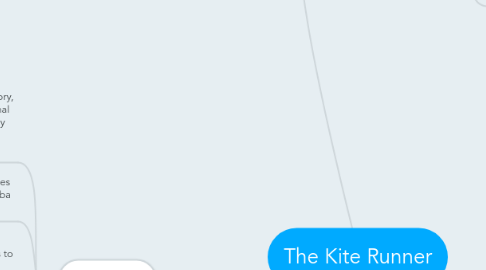
1. Literary Devices
1.1. Foreshadowing
1.1.1. At the end of a few chapters Khaled Hosseini has written in some foreshadowing statements, such as the last sentence in chapter 2, "Looking back on it now, I think the foundation for what happened in the winter of 1975-and all that followed-was already laid in those first words". The words he is referencing is how the narrators first word was the name of his father, while Hassan's first word was the narrators name. This foreshadows the narrators (Amir) betrayal of Hassan.
1.2. Symbolism
1.2.1. The actual kite running competitions that Amir and Hassan participated in as a kid are representative of the childhood they shared, the teamwork and friendship that Amir took for granted, and at the end of the book, Amir flies a kite with Sohrab, which is meaningful in that it shows a sort of rebirth for both Amir and Sohrab, into a new, more peaceful life.
2. Motifs and Themes
2.1. Flash backs
2.1.1. A large portion of the story is told from the point of view of Amir living in the U.S. years after the events of his childhood.
2.2. Irony
2.2.1. One of the first things Ali says about Amir's writing is that he has captured irony at an impressively young age, but then he is unable to avoid his ironic fate, where he chooses to ignore Hassan's rape for the approval of his father, but in turn just makes his life worse. Not to mention all the tiny ironies scattered throughout the book. Ex. Amir becomes like Baba in that both Amir and Baba betrayed their best friends in humiliating and rather horrid ways.
3. Summaries
3.1. Chapters 1-6: All foreshadowing and backstory, these chapters set the scene for the emotional event in chapter 7. These chapters essentially characterize Amir, Hassan, their parents, and sets the tone for the book.
3.2. Chapters 7-10: Amir betrays Hassan and forces Hassan out of Baba's houshold. Amir and Baba move to America.
3.3. Chapters 11-15: Amir courts Soraya as Baba is dying from cancer, Amir returns to Afghanistan.
3.4. Chapter 16-20: Amir discovers Hassan's fate, meets with Rahim, Learns about Sohrab and is heading to Kabul to retrieve Sohrab.
3.5. Chapters 21-25: Getting Sohrab was actually harder than previously thought, as war has ravaged Afghanistan thoroughly since Amir's absence. He has to deal with the Taliban, Assef is part of them now, and after he gets Sohrab he returns to America with him and takes responsibility. A good Catharsis ending that still ties the beginning of the story to the end.
4. Characters
4.1. Hassan
4.1.1. A Hazara boy, he grows up beside Amir, and often takes the blame for their mischievous antics, later Amir betrays him by allowing him to be raped by Assef, he has a son named Sohrab who is a key character as well.
4.2. Amir
4.2.1. Amir is the main character, very human in his mistakes. He simply wants his fathers affection, and in his struggle for approval, he allows his best friend from birth to be raped by Assef. He eventually comes to terms and helps Hassan's son Sohrab as his father Baba never helped him, and in being a good friend as he never was to Hassan.
4.3. Assef
4.3.1. Complete and total jerk, he's racist, he's sadistic, he claims Hitler is his role model, he raped Hassan. Not to mention we can infer that Sohrab was probably treated pretty badly when in Assef's custody. All around, not someone I would ever want to meet.
4.4. Sohrab
4.4.1. Essentially, after Amir betrayed Hassan, there was a huge moral debt to be payed by Amir, Sohrab is Hassan's son, so by giving Sohrab what he never had, Amir sort of redeems himself.

